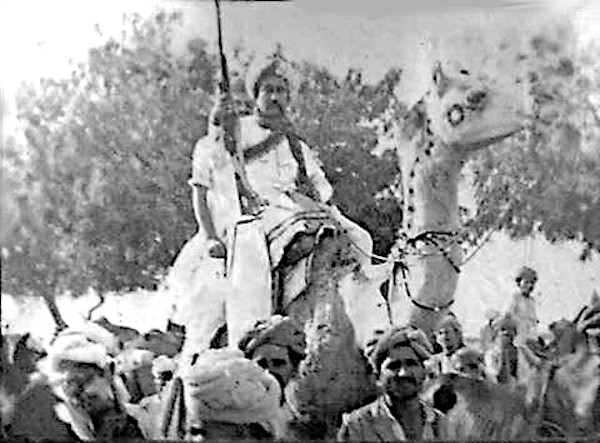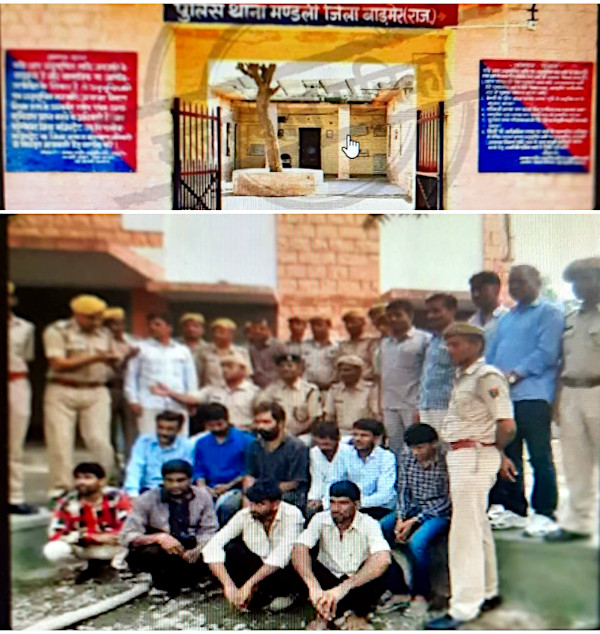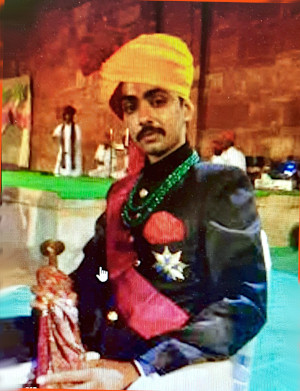Latest Contributions
An Unexpected Encounter

I. C. Srivastava was born in 1943. A student of English Literature, he joined the Indian Administrative Service in 1966. During his 37 year tenure, he served as Collector/ District Magistrate of three districts, rising to the position of Chairman, Board of Revenue, Rajasthan.
Shri Srivastava worked as Secretary/Principal Secretary of as many as 17 Rajasthan State Departments, including Revenue, Irrigation, Education, Culture, Tourism, Sports, and Women & Child Development Department. He retired as Chairman, Rajasthan State Mines and Minerals Corporation.
Shri Srivastava has authored several books on Administration & Current affairs in Hindi and English. Nowadays, he is associated with various social and cultural voluntary organisations in Jaipur.
After going through the fierce trials and travails of Indo-Pak War (Dec-1971), my role as Collector and District Magistrate, Barmer extended to providing immediate relief to refugees from Pakistan areas, who had literally walked into India from Indian army occupied territories which included the whole of Chhahro Tehsil and parts of Nagarparker and Mithi Tehsils of Thar Parker Dist of Pakistan.
The relief work was organized on war footing by
(a) commissioning PHED tube well points for locating camps for refugees
(b) drawing over RS. 6 lacs in instalments under Treasury Manual (Rule 27) empowering Collector for such emergent contingences
(c) sanctioning rations under an earlier circular of G.O.I. laying down scale of daal, oil, sugar and wheat etc
(d) promoting Patwaris as Inspector Last Records (ILR) and LRs as Naib Tehsildars. Such an initiative was never questioned for I had informed both Govt. of Rajasthan & GOI on the action taken and no explanation was ever asked for all steps taken during and in the aftermath of war.
However administrative system takes its own grind and milling as the routine work catches up with the officers at all levels. Higher officers too are expected to carry out yearly inspections to be completed before the end March. Hence the quick round of inspections and night halts followed through.
One evening in March 1972, on arriving at Bakhasar Police Station, the southern tip of Barmer district (which looks like a cape on the district map which itself looks like a replica of India map) I witnessed a most remarkable spectacle which is still etched in my memory and is apparently worth sketching in words.
A knight in armour’s horse highly gilded and glimmering and glowing in the last rays of sun and basking in its glorious and glamorous appearance in upright posture formed a spectacle which is embedded still in my memory. As I alighted from the car, I found no one near the solitary horse.
But soon enough, lo and behold, its master. Thakur Balwant Singh hastily came out from the arched courtyard of the Police Station and greeted me with Marwar greeting khamma ghani in Rajput’ s chivalrous, slight bow paying his obeisance and respect to the institution of the District Head which I represented.
Balwant Singh was an ex-dacoit who was a terror across the desert areas of Indian sub-continent before surrendering to Rajasthan Government after the 1965 Indo–Pak War. He also helped the Indian army in 1965 War. I admired his horse and asked a few questions about the décor, upkeep and the beautiful saddle and other accessories which together gave the horse its traditional fairy-tale appearance.

Balwant Singh on a camel at the Sanchore Mela in the 1950s.
More surprise awaited me as I turned around to go inside the police station. S.H.O. though well-built looked rather sheepish as he paid his respects and followed Balwant Singh and me.
It was Balwant Singh and he alone seemed to be in command of the affairs of the Police station for he escorted me around for inspection of each room explaining everything in great detail such as goods and materials stored in Maalkhana, the weapons and arms in the armory besides Havalat and the room meant for the Special Police Officers i.e. civilians recruited by the District S.P. to assist district administration in keeping a vigil on the border besides collecting intelligence on cross border activities.

Barmer police station.
Balwant Singh finally left me with in-charge of S.H.O. when we reached the table and chairs meant for my inspection purposes. I made brief notes on my observations and impressions based on discussions with SHO (who meekly kept on standing) and after looking into statements and detailed write-up produced by the staff sent in advance.
Inspection over, I made my way to the Rest Room meant for the Inspecting Officers. Barely had I settled myself to take rest on the sturdy high-level deeply cushioned cot when the great Balwant Singh reappeared and I had enough time to have a close look at him.

Balwant Singh
His eyes were bloodshot with traces of opium consumption glistened with ‘Kajal’ on the eyelashes. His protruded cheek bones and the sunken cheeks hid his past history of awe-inspiring cross border horrific acts of dacoity and murder, etc.
His gunshots it was believed, also struck terror among the poor peasantry of Pakistan as they did on the Indian side. His well-kept, long moustache was the only remnant of his awesome past.
All told, Balwant Singh with his ornate turban, a Gujarati shirt and a Kutch-style worn Dhoti tucked into his loins seemed to be an old specimen of his once-upon-a-time, well-recognized dacoit character coming out of the pages of pre–1965 (Indo-Pak war) history.
Balwant Singh with his reverential bow and Khamma Ghani invited me to his residence for the evening meal made with Gujarati Rajput menu especially the sweet loaves, ‘Roti’ made of wheat and barley mix.
This instantly posed a dilemma in my mind as how to say ‘no’ with all politeness or to accept in a manner without compromising my official position. After all, he was still considered the Thikanedar or ex-chief of the area and commanded the respect which was still reckoned as a historic legacy. The pre-independence Nazim of Jodhpur state would have his traditionally accepted, if not mandatory dinner at Thakur’s place without any compunction.
But to me, it seemed rather an anachronistic besides being against Conduct Rules to go and dine with an–ex-dacoit, however good a gentlemen or Special Police Officer he would have become by then.
I overcame my own dilemma by sending for SHO whom I asked to get some food prepared by his staff besides telling the Thakur to send some sweet Gujarati-Kutchi ‘Roti’ to go with that food. A good sleep lulled and enveloped my shaken nerves.
Next day, early morning, I had left for Barmer before the Special Police Officer Balwant Singh could return to the Police Station to bid me farewell.
Comments
publication of my story
Dear Editor
wonderful work to bring alive the man - a terror if not a terrorist of his times across the Thar deserts districts of Indo - Pak borders.
Balwant Singh the dacoit who eventually became Sarpanch of Bakhasar and SPO of Barmer District..
all by hte foresight of the visionary CM ML Sukhadia
We need more on this
Balwant Singh was such a character! We need more on him - if you have more
Quite an interesting &
Quite an interesting & captivating tale like description.
_You are an untiring prolific writer with a literary flavour - a big inspiration for us_!!
Nice reminiscence. In western
Nice reminiscence. In western rajasthan, the desert districts of Barmer & Jaiselmer has many such tales of the Rajput dacoits. There are many folk songs made and sung till date, containg tales of their strong character, as Godfather for the poor and down trodden and protector of territory from invadors. They were know for their good deeds towards the needy and poor citizens and their ferocious attitudes towards invaders and traders who caused atrocities on them. Dacoit Man Singh was one such character. My Grand father Mr. Laxman Singh and then his son Mr. Shantanu Kumar served as in Barmer district as Superintend of Police. Shantanu Kumar ji was awarded Presidents Medal for galantry for his exemplary services during 1971 Info-Pak War.
Reminiscences
Shantanu was my dearest colleague. We fought war together. I have many stories to tell.Please contact me on phone 9414300818
Service colleague
IC has written wonderfully well about an episode quite early in his career. It makes very interesting reading as it combines the description of a fairly normal and routine part of the Dristrict Officer' s work ( through I dare say no so t normal or routine in the case of many DOs then and perhaps more so now), and the presence of Balwant Singh , a former dreaded dacoit, and now a SPO of the area, during the inspection, and his description brings out the personality of this larger than life figure. Kudos to IC for not only remembering the whole episode in minute detail but recounting it with aplomb and dextrous use of the English language.
Very interesting account
Very interesting account of the visit to the rural sector of Barmer district in the aftermath of the 1971 war. The dilemma of having dinner at the ex-dacoit's home has been aptly described. In the first paragraph, it should be Chhachro tehsil, instead of Chhahro.
IC story
Well done. The dilemma caused by the invitation was well handled.
your stroy IC
Good story . well told IC
your story IC
Read it. You have had a colourful gripping fascinating professional career. And you have gainfully utilised your movements and moments. Congratulations IC
Surrendered Dacoit
Very interesting story of a meeting of two generations and two worlds. A young urban lad and a veteran, hardened surrendered dacoit. Both keeping to their maryada.
Your story
Shri Srivastav Saheb has really drawn a very true picture of Balvant Singh of Bakhasar. I had an occasion to work under him during his tenure of two years as Collector and DM Barmer. Hence I accompanied him during the course of inspection of police station.I had learnt that Balvant Singh had surrendered to the police under govt's policy of granting amnesty to such dacoits who surrendered .Probably he was also elected sarpanch of Bakhasar panchayat
Comment by Shri Rikhabh Das Jain
I am indeed happy that Shri Rikhabh Das who accompanied me to Bakhasar for Police Station Inspection could recall vividly the meeting with Balwant Singh
Besides he has mentioned about Balwant Singh's surrender at Jodhpur as dacoit under state Governments's policy and later his election as Sarpanch
My sincere thanks to him.
Inspection of Bakhsar Police Station by Sri I C Srivastava
Very well written. Brings out the persona of Balwant Singh alive. There were innumerable personalities like Balwant Singh all over India. What is disconcerting is that lower echelons of administration paid obeisance to such people. Collector's own discomfiture is also expressed in the reminiscence.
Comment by Shri Ravindra Gupta
Shri Ravindra Gupta my Batchmate friend of IAS Service has given a sharply focused comment which is appropriate and appreciative except that I had felt uneasy to begin with to see Balwant Singh escorting me inside PS on his own initiative but only as SPO. I felt no discomfiture as such.I officially inspected PS registered and discussed details of crime etc with SHO after Balwant Singh had left.
Sir I would like to make a
Sir I would like to make a humble request to you Describe Discussion with Balwant Singh Bakhasar
Your story IC
Very well written description of a official visit in a interesting story form. To describe the things which happened five decades back is commendable. I personally know I C sir he is very well read person. I wait for more such happenings in a story form. Thanks sir for posting the above write up.
Add new comment